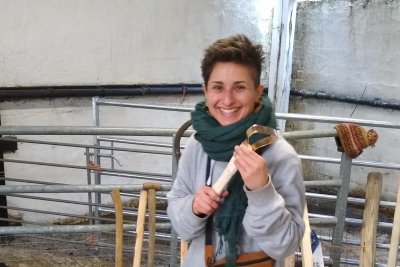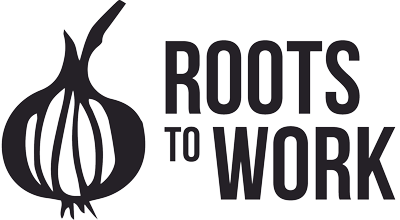
Please introduce yourself and what you do.
I am currently finishing a PhD at Cardiff University on the organising and learning practices of the UK agroecology movement and have been involved in a number of research projects related to sustainable food systems. I’m particularly interested in participatory and activist research approaches. I am also involved in local community food organising, including co-founding Splo-down, a member-run community food cooperative which supports access to good quality and sustainable food through a sliding scale pricing model. I have co-founded Teasel, a queer land justice collective in Cardiff focused on agroecological skills building, connection to land, and political education with the local queer community. More broadly, I work as a facilitator working to develop organisational processes, run participatory food systems events, and organise trainings and residentials.
What was your route into the sustainable food sector?
I was always passionate about food and at university got involved in different types of activism as well as community food projects and community gardens. I trained to be a teacher and was quickly disillusioned with the education system so I started seeking out community and movement-based models of education and learning. That’s when I came across La Via Campesina and the popular education models in the agroecology movement. I started getting involved in research work related to this and became more involved in the UK agroecology movement and local food systems organising in Cardiff - over the last few years it has become my life!
I have moved from mathematics to the social sciences largely through my involvement in social movements and community organising giving me the awareness and education needed - these spaces are vital for developing political consciousness. If you want to move into the food and farming from another sector, my advice would be to get involved and craft your path towards the career you want bit by bit, developing the skills and networks you need.
What’s the best thing about your work and research?
Getting to work with other people and be inspired by all of the action, critical thinking, creativity, and hope in the agroecology movement. I especially love being on farms and getting to facilitate spaces for activists and landworkers to reflect on the state of the food system and their role in creating change. Within the PhD it has been great to engage with models of organising and learning that are coming from the movement and have the chance to think deeply about how we build collective power to change the food system. The work I do to understand how social movements organise and how people collectively develop knowledge and scale out practices is deeply integrated with all of my other work as an activist, organiser, and facilitator and so I have learnt a lot and get a lot of joy from bringing all of those things together.
What challenges or obstacles have you faced in your career and how have you overcome them?
It can be challenging to navigate between the roles of academic and activist, particularly in terms of time and energy. I have many criticisms of academia and have tried to do research in a way that aligns with my principles but ultimately this has meant sacrificing success as an academic in the traditional sense of publishing in academic journals. I also had a hard time early on trying to figure out how to make the research participatory while recognising all of the constraints on activists and landworkers’ time and energy. As an early career researcher, I haven’t had access to the kinds of resources that mean I can pay for people’s time to participate. Instead, I have focused on other ways of developing reciprocal relationships with the movement and on supporting participatory learning processes to help activists reflect on and develop their practices. As I have focused a lot on practical action I am now trying to catch up with finishing my PhD thesis writing and work more on the kinds of outputs I see as being valuable to the movement, like podcasts, workshops, and blogs.
Who inspire your work in this movement?
So many people I work with in the food sovereignty movement and other connected movements inspire me so much! I have learnt so much from others who are all working tirelessly to create a better food system, particularly in the Landworkers’ Alliance.
There are also some really great agroecology researchers who I have been inspired by such as those at the Centre for Agroecology, Water and Resilience.
In my research, I’ve been looking at the social movement ecology approach of Ayni Institute and Ulex Project [training programmes and platforms] and the perspectives on coalition building of early US feminists of colour like Gloria Anzaldúa and Bernice Johnson Reagon. I’ve also learnt a lot through Navigate Coop and facilitators I’ve been connected to through their trainings.
What are your hopes for the future?
I believe that we can build social movements that are able to build bridges across difference while still tackling systemic inequities and different forms of marginalisation to create the collective power we need to transform society. The food sovereignty movement can be a big part in that and I'm hopeful that we can address divisions between conventional and agroecological actors while holding onto the transformative vision we have for food system change. I think this is going to take a lot of collective strategic work and (un)learning with others.
I hope to finish my PhD within the next month and find useful ways for the ideas generated by it to contribute to the movement. I look forward to having more time for facilitation work and being active in the movement and in my community. I feel incredibly lucky to be part of some exciting projects with others and definitely have a lot on the horizon to keep me busy!
What advice would you give to anyone that is passionate about sustainable food systems and wants to work in this sector?
For people who want to get into sustainable food systems research: make sure that you are always including people and valuing different forms of knowledge, as well as making sure the research has practical application. For Masters and PhD students, I think there can often be the tendency for people who are passionate about social change to be very ambitious with their projects and, in reality, many practical challenges arise to doing research in the ways we would want to. So, my advice would be to start small, be responsive and flexible, and try not to overestimate the contribution of your research but focus on what is feasible and has clear benefit.
I think researchers are really important in the movement and there are many examples of really great collaborative research projects. But research processes can also be extractive and academic timeframes tend to be very slow compared to the pace of work in the movement. The UK system of academia is very broken and while some researchers really manage to carve out their own space within that, there are a lot of challenges to contend with if you want to do ethical research that has genuine social impact and also have a successful academic career. I would advise people to think carefully about whether academia is really the route they want to take for the kind of change they are interested in and to also engage with grassroots forms of learning, theorising, and research rather than seeing universities as having a monopoly on knowledge production.
You can keep up to date with Ali's work on their research website Resisting, Learning, Growing or via X @alicetahi.



